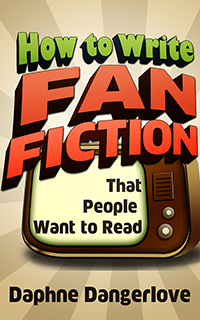Thoughts on Co-Authoring Fanfiction
by Dwyn Arthur
Writing is often said to be a solitary
craft, and there is indeed the image of a writer sitting alone in a room, with
a typewriter and a large stack of white sheets, in the classic form. This is more starkly the case for the writer
of prose fiction, since the author is not merely drafting words, but describing
life in a universe that exists in a single person’s imagination. But in the case of fan fiction, that universe
does not exist in a single mind. Rather,
it exists in the heads of the entire community that follows some work, be it a
television show, movie, or novel.
Despite this, fan fiction writers mostly
work alone, developing ideas and writing stories. Many work without editors or reviewers, and
in an era of online self-publishing through sites like fanfiction.net, can
release a work to the public unseen by any eyes other than the author’s
own. At most, one editor, or “beta,”
will have reviewed a text privately.
Added to this is the need for discretion
and privacy. Outsiders unfamiliar with
the practices and norms of fan fiction do not view it as a literary form. To them it is mostly a sign that someone is
obsessed with a show, or worse, the actors who perform on that show. Direct online publishing allows authors to
maintain the privacy that they need to maintain both comfort and creativity,
away from judgmental eyes.
Even the websites that authors use to
publish their fan fictions operate from the premise that they will work
alone. Accounts on the most prominent
sites are individualized, and do not permit writers to label stories as
co-authored. Authors must establish
separate joint accounts as though they were for a single person (accounts that
seem to draw fewer story views, since readers have already set story alerts for
authors as individuals), or must post stories under one of the writer’s
accounts, and attempt to explain the co-writing venture using author’s notes.
Taken together, these factors encourage fan
fiction writers to work alone. However,
some of the most innovative stories have been the products of co-authors. Joint authors can bring different
perspectives to their shared work, different interpretations of a show’s canon
as well as the works of other fan fiction authors.
I am fortunate to be part of a successful
co-writing partnership with one of this site’s co-editors, TheWrtrInMe, a
partnership that has not only forced me to “up my game” as a fiction writer,
but that has also helped me to maintain my enthusiasm for writing fan fiction. On the basis of nearly a year of co-writing,
I have some thoughts on several important issues that writers must deal with
when collaborating.
Compatibility: My co-author and I did not set out to
collaborate at the start. I served as
her beta, initially editing stories for grammar and typographical errors. In time, that expanded to making suggestions
on the plot of stories, and on the plots of new stories as they were developed. In time, our work became so intertwined that
it was correct to bill it as joint work, and we found ourselves writing the
stories together.
Vision:
Co-authors will find that their work proceeds more smoothly when they
agree on where a story will go. My
co-author and I have been very lucky to agree on the plots to our stories, and
especially upon the climax and denouement to each story. This draws on a shared interpretation of the
show that we track, and agreement especially on changes we need to make to that
show’s canon as we write.
Ego:
Writers obviously seek credit for their work, and that becomes more
important in fan fiction, since the only recompense for work is credit as
author. There is always the risk that
authors may feel that a co-writer is taking credit for their work, and
co-authors must understand how their efforts fit together, whether one author
takes the lead in cutting the first draft of a story, or whether it is a
full-fledged tag-team effort where each author drafts part of the story.
Deadlines:
Writer’s block is difficult enough to deal with then a solitary writer
gets stuck in a text. It is more painful
when writer’s block slows another writer down.
Co-writing requires an ability to avoid writer’s block, or at the very
least to find a way to stay writing through it, and to meet joint deadlines for
having manuscripts ready.
Co-Writing and the Internet: We recognize that our collaboration largely
owes itself to the internet, where we can e-mail word processing files, edit
them, and merge them into larger stories.
Twenty years ago, we could not have read and edited each other’s work in
real time, and been as productive writing together.












3 comments:
Well said. I don't know if I can co-write I've never had the opportunity.
AO3 finally let co-authors share posting with less explanation in the notes. I think it would be wise if all fanfiction sites allowed this.
Do you and your co-writer ever disagree? How do you handle it?
I have never attempted a co-author. I was asked once but they weren't serious and the story never made it pass the idea of evendoing it. It must be great to have a co author that you can rely on.
Have you two ever disagreed about the direction of a story or how to handle something?
Well, we’ve been very lucky in that we have never disagreed on the direction of stories. In fact, it’s because we agree as much as we do, and because we interpret our fandom (iCarly, and we’re both Seddie fans, on the same side of the show’s major dividing line) the same way, that we went from betaing each other’s work to full co-authoring.
While we co-author, usually any one chapter or story because as one author’s idea, and that author takes the first cut at mapping out the chapter. Most of the time, that author also goes on to write the first draft. We both tend to defer to the story’s “originator” on plot issues, and we’ve been lucky that we’ve never had a story we couldn’t fully agree on. And if two writers have that happen a lot, they might be a mismatched pair.
Post a Comment